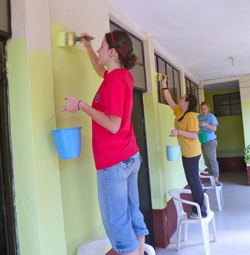A lesson in social justice...
Compliments of a stove
March 28, 2012
By Jill Yanish '13

Just recently, a stove taught me a lesson - no, not how to cook. It showed me what social justice really means.
The definition of social justice came to me in this unusual form during spring break when nine Bennies and I traveled to San Lucas, Guatemala as part of the Alternative Break Experiences program sponsored by CSB Campus Ministry.
We worked on projects through the San Lucas Mission, including building a stove for a family. The volunteers at the Mission stressed that learning was more important than the actual work we were to do. They also informed us about the importance of completing tasks the way the native people tell us and not imposing our American ways of doing things, even though we might be able to think of more efficient ways.
Building a stove is not easy, let alone building a stove the Guatemalan way. We went to the family's house and were instructed to construct a stove using only cement blocks, shovels, a machete and a hammer. We mixed the cement with our hands on the dirt floor in the middle of the family's living area.
This experience taught us many things, such as it does not kill you to roll up your sleeves and get a little dirty - and by a little dirty, I mean having your hands and arms caked with cement. Building the stove would have been a lot easier if we had better tools. However, we learned to work with the resources available and to accept and appreciate the natives' style of work.
Building a stove showed me how social justice is a way of life. Social justice entails thinking about a family in Guatemala that does not have a stove and connecting that family to the larger picture of how societal structures constrain a family from being able to own a stove.
We learned a lot of other lessons through our work in Guatemala. We sorted coffee beans and learned about the importance of fair trade coffee. We painted the clinic and learned about the Guatemalan cultural perspective of hospitals. We hauled dirt and rocks at the women's center and learned about the problems women face in Guatemala. We weeded a vegetable garden and learned the value of humbling work.
From our experiences, the group and I developed a life motto, "A little Guatemala doesn't hurt anyone." This motto means that working hard, learning from others, experiencing a different culture, saying "Hola" to strangers in the street and getting a little dirty does everyone some good.
